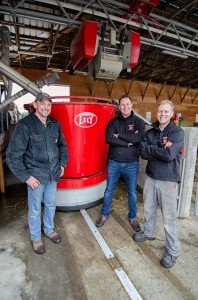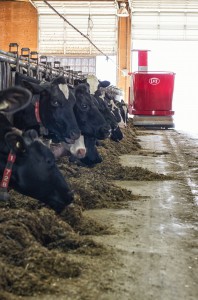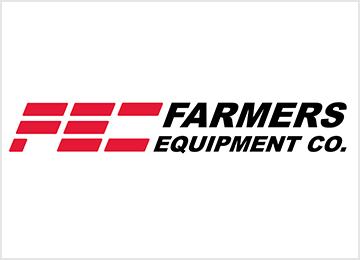Improving Feed Efficiency with Flexible Fresh Feeding
Whether it is to increase production, reduce labour costs or streamline operations, more farms are relying on advanced technologies to improve systems. The upfront costs might be steep, but the gains will most certainly ease the path ahead.
One of the most well-known manufacturers of automated farm systems is Lely of Holland. The company was founded by brothers Cornelis and Arij van der Lely who believed that a farmer’s workload could, and should, be eased by machinery. Their first patent for a finger wheel rake was in 1948, and this launched the company which now offers the latest in farm technologies worldwide.

The systems and equipment produced by Lely and sold by dealers like West Coast Robotics (WCR) in Abbotsford, BC, are revolutionizing the dairy industry. Jan Rodenburg of WCR explained that the company was founded by Eric vanDyk, a retired dairy farmer, and Brian Rodenburg in 2008. WCR is one of the first independent Lely dealerships in North America and supports farmers in a variety of ways: installation and servicing of equipment, barn planning, management support and training of staff.
Perhaps the most important part of dairy production is the feeding of the cows. A content, healthy, high-producing herd requires sufficient nutrients, and making sure each individual cow is receiving enough food is crucial. One technology WCR provided to five farms in the Fraser Valley, and over 35 throughout BC, is the Lely Vector Automatic Feeding System.
“Return on investment can seen very quickly with the Vector,” said Rodenburg. “Most farms decrease their labour costs right away, and we’ve seen up to a 65 per cent reduction. The Vector allows for 24-hour, flexible and accurate fresh feeding, freeing up a farmer’s valuable time.”
A demonstration of the Vector robot’s abilities can be watched online. The robot parks itself in the feed kitchen next to the neatly stacked piles of food and nutrients, waiting for the feed grabber to load up its mixer. It then follows a programmed path into the barn. Using sensors and lasers, the autonomous vehicle accurately distributes the feed to the waiting cows.
“Farms are filling the feed kitchen about once every three to seven days in the winter and once every two to three days in the summer,” Rodenburg explained. Once programmed, the robot is left on its own to do its thing. Up to 300 head can be fed per day and a second Mixing and Feeding Robot (MFR) can be easily added to larger operations.
The robot is extremely adaptable. “If you have any changes in group sizes, this machine will measure how much feed is being consumed several times a day and adjust accordingly. The farmer can enter in the number of cows, but the robot will automatically adjust depending on the needs of the group,” Rodenburg said. There are different cow groupings on a dairy farm requiring different feed blends: young stock, milking cows and dry cows etc. The robot can manage up to 16 different group feedings.

Food waste reduction differs per farm, but is definitely an added bonus. “Feeding smaller portions multiple times a day means there is a lot less refusal and cows eat what is provided. Feed leftovers are reduced,” Rodenburg added. The robot also backtracks and pushes the leftovers towards the feeding fence so the animals can reach it. The multiple feedings a day also stabilizes the PH in the rumen which is better for cow health.
Another benefit of using the robotic feeder is found in the barn construction. “If building a new facility, farmers can get away with narrower feed alleys which can reduce building costs significantly,” explained Rodenburg.
And it is also very easy to add to the system. “If you are expanding your operation or adding a barn, it doesn’t take a lot to incorporate the extra feedings in the new facility.”
Rodenburg said, “In combination with our Lely Astronaut Milking System, farmers can receive valuable feedback on cow health, feed efficiency and feed costs.”
Not only does WCR sell Lely products, they are also suppliers of most of the tools and equipment all dairy farms require: pasteurizers, igloos, free stalls and troughs, chemicals and consumables, rubber matting and even the Dual Chamber Cow (DCC) waterbeds mentioned in a previous issue of Modern Agriculture Magazine (Cow Stall Comfort).
Visit WCR online where you will find information on all of WCR’s products and videos of the robots in action.
[logo][infobox title=’FREE Subscription!’]Don’t miss out on one more issue! You are ONE Click away from receiving 4 Free issues a year >> SUBSCRIBE [/infobox]












